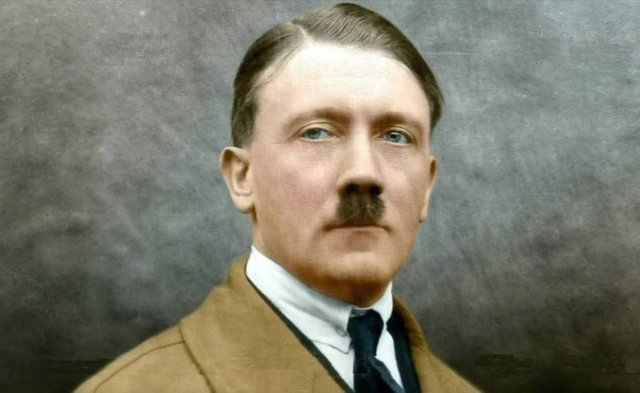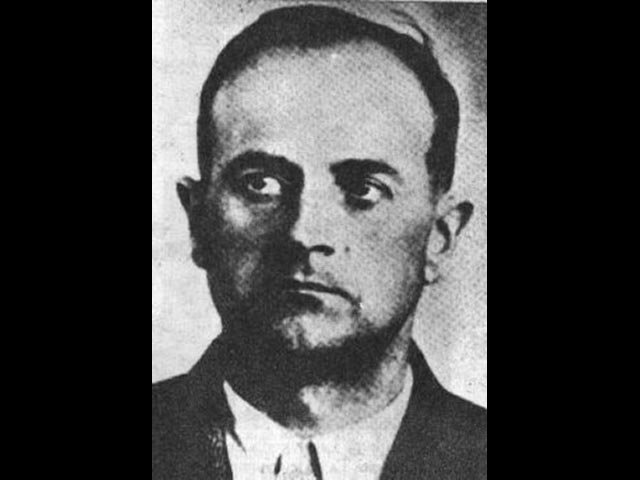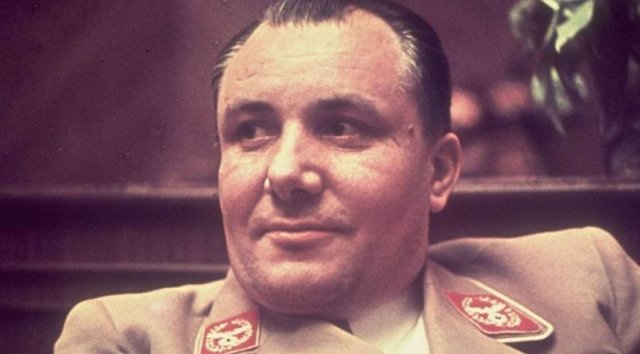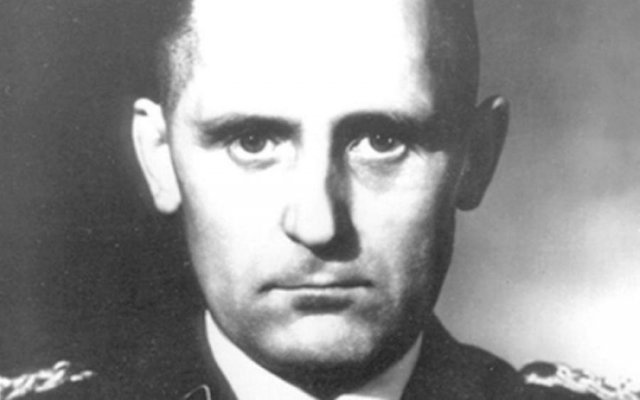An unsolved mystery of the 20th century: the Mysterious disappearance of the leaders of the Third Reich
Another issue of a series of articles SECRETS of the 20TH CENTURY. Today it is "the Mysterious disappearance of the leaders of the Third Reich". The second world war was coming to its end, the highest German officials realized that the defeat of Germany is inevitable. Then in 1945 came the Organization of former members of the Waffen SS. The task of this structure was to provide assistance to high-ranking German war criminals, the organization had enough material resources. The Nazis now spent the values and other material resources they had plundered in the countries conquered during the war on preparing and carrying out the illegal transfer of the SS away from retribution, for example, to Latin America, the middle East, and Africa.

SS sturmbannführer Fritz Paul Swede
It should be emphasized that the former fascist leaders not only had the opportunity to escape punishment for their crimes. They also had a chance to start their own business and become successful businessmen, because in many banks of the world they had previously opened secret deposits. An example is the postwar life of SS sturmbannführer Fritz Paul Schwend. The criminal record includes mass executions of civilians. He was vigorously sought, but in vain. Even during the war, p. Schwend organized a successfully functioning group in the economic Department of the VI division of the RSHA. The basis of its activities was the sale of counterfeit money. Having got a solid account, p. Schwend got fake documents. There were a few: in the name of Vindicia, Turi, Bertera etc. P. Schwende in the spring of 1945 settled in Peru and became the owner of a thriving company.
However, not all German military officials safely managed so to arrange his fate. Many of them were captured. For example, the SS obersturmbannführer Adolf Eichman was sent to an American transit camp. Nevertheless, he prepared for the escape, and, admittedly, very successfully. Somehow (the circumstances of the escape remained unclear) he went to Latin America for a long time and secretly lived there. However, in the late 1950s, his trail left the Israeli intelligence "Mossad", or rather, first, "Changmin" ("Avenging angels") is a special Jewish formation. The fact that even before the Second world war A. Eichmann performed the duties of the expert on Jewish questions of the Chief of the Imperial security Directorate. He (among other figures of the Third Reich) had the idea to turn Auschwitz into a place of "final solution of the Jewish question", i.e. a place where people were massacred.
"Punishing angels" specialized in the search for Nazi criminals who killed Jews in concentration camps. On the trail of Adolf Eichmann by the Israeli secret service came quite by accident. Someone L. Herman, an Argentinian of Jewish origin, who lived in Buenos Aires, said that the young man of his daughter boasted that his father had great services to Germany during the Second world war. After checking found that "deserved Nazis" by none other than A. Eichmann. However, all the data had to be carefully checked to verify the identity of the offender. But while the intelligence structure decisions were made on how best to deliver A. Eichmann (if that's the Nazis) to Israel for justice, A., Eichmann fled. Then to Argentina arrived a few employees of the "Mossad" and one of them, E. Elrom, was especially eager to catch the criminal, since all his family died in a concentration camp. The agents of Mossad had all the necessary information. They were aware of all his family holidays (birthdays, weddings, etc.), had a detailed verbal portrait. The agents did not have photos of him only.
It should be said that A Eichman was ready to cooperate with Israeli agents, he openly answered the questions asked to him, which were necessary for the subsequent trial of him. He was scared and confused, always saying he'd either be shot or poisoned.
Searches A. Eichmann was successful in 1959, the Agents were able to establish that under the guise of a bankrupt master, Laundry Eichmann lived in the same Buenos Aires under the name Ricardo Clement. Again, to obtain irrefutable evidence for the house of R. Clement began to watch around the clock. The work of the agents eventually succeeded. Once R. Clement came home with a huge flower bouquet, as it turned out later, on the day of his silver wedding. The scouts checked with their data and finally convinced that this is the Nazi who managed to escape immediately after the war.
Mossad has developed a plan for the operation to capture and transport him to Israel. In the capital of Argentina, flew to the chief of the Israeli intelligence I. Harel. The plan of the operation was thought out in detail, up to the organization of a special travel Agency for delivery to Argentina under the guise of tourists a group of scouts consisting of 30 people. Been pre-prepared documents and to A. Eichmann. At the time of the operation was specially rented fleet of cars and other vehicles.
One of the main points of the operation was the question about the transportation of Eichmann. The security services considered two options: by sea (but it took at least two months) and by plane of the Israeli airline "El al", which was supposed to bring home the Israeli delegation, who visited the celebrations on the occasion of the fiftieth anniversary of independence of Argentina.
The beginning of the operation was scheduled for may 11, 1960 in the Evening on the street where lived Signor R. Clement, at some distance from each other stopped two cars. Their drivers began to Tinker with the engine. They were waiting for the bus, which was supposed to come home to Eichmann. The former Nazi came out only from the fourth bus, forcing the scouts pretty worried. It all happened in seconds. And Eichmann did not even have time to open his mouth, as he was dragged into the back seat. At the safe house, the scouts first checked the presence on the shoulder of his personal number. In its place was a scar. However, he immediately confessed that he was the one they were looking for, and that he had destroyed his number in the American camp.
He signed a document confirming that he agreed to go to Israel. The arrogant and domineering SS turned into a miserable and depressed person. The Israeli intelligence could not be afraid that the relatives would be looking for him: it was dangerous to contact the police, because then it was necessary to admit that the wanted person lives on forged documents. And yet the scouts decided to hedge. One of the crew members (of course, a dummy) was taken to the hospital with a "concussion". When he was discharged, the document pasted a photo of Eichmann. Fake passports were also prepared for the departure of other agents.
Just before the flight, Eichmann was injected with a tranquilizer, picked up under his arms and dragged on Board the aircraft. The guard, who watched as the whole trio, laughing loudly and waving his hands, went to the plane, was surprised, but he was explained that it is supposedly a spare crew that will not take part in the flight and therefore allowed himself to drink fairly. Since all three were indeed in the form of El al, no one checked their documents. May 11, 1961 in Jerusalem, the trial of the Nazi criminal, A. Eichmann, took place. He was accused of mass extermination and sentenced to death by hanging.
SS sturmbannfuhrer Eduard Rochman

Another Nazi, SS sturmbannführer Eduard Roschman, nicknamed the Butcher, to avoid persecution, decided to fake his own death at the end of the war. When the Americans began to search for him, they found a mutilated corpse, in which they recognized E. Rochman, the murderer of more than 40,000 people. A "corpse" meanwhile was in the Bavarian Alps, where the assets of the Organization in a secluded sanctuary waiting for the right moment to send in a safe place other such criminals. I must say that staying in the cold mountains did not benefit E. Rochman. He froze his toes and had to have an amputation. The attempt to establish the identity of the doctor who operated on Roschman, did not give any result. But after amputation he had a special sign-a hobbling gait, which later helped in his identification.
For some time E. Rochman (about three years) lived in one of the European countries. Since he was considered dead, no one was looking for him. Perhaps not only because he believed in his death – a considerable sum in the accounts of the Organization could slow down any search. Then E. Roshman received false documents and went to Latin America. A year he lived in Argentina under the guise of a Swiss citizen Fritz Werner, then the "Swiss" suddenly disappeared. E. Roshman was reborn under the name of Federico Bernardo Wegner, an Argentine citizen. After a while, someone sent E. Romano check for the fabulous for those times the sum – $ 50,000, and the sender did not manage to find. Needless to say, it was the work of the same Organization that took care of former colleagues.
With the money received from the Organization, E. Roshman went into business. His company "Stadler and Wegner" sent to European countries fine wood. It should be noted that the Argentine authorities were not too curious about the identity of E. Rochman – again, because the Organization protected its wards from the police of the countries in which they had taken refuge from the international court of justice. So comfortably E. Rochman lived in Argentina for about 20 years. However, in the 1970s, he was identified by One of the witnesses of E. Roschman's massacres with his victims. This became known to the German authorities. Anti-fascist organizations have intensified their activities, and Argentina had to give consent to the extradition of Germany war criminal: in the face of the world community could not continue to hide the German executioner.
E. Roshman, undoubtedly, knew that he was going to be extradited to Germany for trial (most likely, he was warned in advance about this). Further events developed according to the classic detective story. E. Roshman was visited by an unknown person and ordered to move to Paraguay. Instructions received by Roshman, were very clear and clear: in the evening to take the bus, to arrive at the designated place to the owner of the bar "Dog-Mar" and wait for him to further instructions. E. Rochman did so. He was placed in a secluded boarding house. For several months he lived in a new place, trying not to attract attention. However, one day he felt bad-it seems that something is wrong with the heart. He was placed in one of the hospitals. After a while he died there. When the police began to study the documents of the deceased, they found that it was not the gentleman for whom he posed. The Paraguayan police contacted Argentina and the latter confirmed that the deceased was a war criminal to be extradited to Germany.
The finale of this story is not quite usual: E. Roschman's body was suddenly somehow stolen from the morgue. This suggests that Roschman's death was the work of an Organization. And the autopsy could have somehow put the police on the trail of someone who followed the Organization's instructions and ended up with E. Roshman in the hospital.
Martin Borman

Another Nazi criminal who managed to escape the international Tribunal is Martin Borman. He was the head of the party office and the second person in Nazi Germany after Hitler. About how he managed to get out of Berlin surrounded by Soviet troops (and whether it was possible at all?), when the Reichstag has fluttered the Banner of Victory, very little is known. Official data say: in order to enter in a new head of the German government – gross-Admiral K. Danica, M. Borman out of the capital, where the fighting had been going on in the streets. With him in the group, trying to get out of the environment, was part of the SS division "Nordland", the remnants of the division "Barenfanger", which defended the Reich Chancellery, the personal pilot of Adolf Hitler X. Bauer, his aide-de-camp O. Herr günsche and driver E. Kempke. On the shore of the spree Soviet gunners fired at the group. The aide-de-camp and the pilot were captured,the driver and one of the leaders of the youth movement managed to escape from the encirclement of the fascist.
About how could M. Borman out of Berlin, witnesses gave directly conflicting testimony. Whether this was done unconsciously or with a well-defined purpose is also a question. The main version is that M. Borman was wounded, but he did not stop, and continued to go, but in the end was still killed. Whether it happened on the outskirts of the capital, or even in the Central part of the city, no one definitely could not say. At the international Tribunal in Nuremberg, M. Borman was sentenced to death in absentia, because the Nazi criminal himself was not present at the trial.
After some time, the press began to leak information that M. Borman still did not die, and safely got out of Berlin. Regarding the fate Of M. Borman, there are several versions. According to one of them, M. Borman got a good job in Latin America.
According to other sources, M. Borman had a plastic surgery and he had no need to hide in Latin America. There were witnesses who claimed that he was free to move around Europe. Other assumptions are based on the fact That M. Borman was in fact nothing more than a Soviet spy. According to this version, in the 1920s On the initiative of the German Communist Ernst Telman M. Borman was sent to Leningrad under the name of Karl. This action was known to very narrow circle of persons. Late M. Borman returned to Germany and so entered into the confidence of the Fuhrer, that was his right hand.
A former member of the Reichstag Paul Hasslen claimed that M. Bormann, showed up in Chile with documents in the name of Juan Gomez. This statement was challenged by the former Spanish diplomat in the UK angel de Velasco. Allegedly, he helped M. Borman to get to Argentina. Along with Chile and Argentina, according to other evidence, Paraguay appears.
When on may 2, 1945 M. Borman gave the Soviet Union a coded message, in which he asked for help, as "Soviet spy" was rescued by the commander of a tank corps of General I. A. Serov. In the Soviet Union, M. Borman lived after the war for 27 years, and after his death was buried in the cemetery in Lefortovo. The author of the publication of the facts given above was a certain person. However, he does not provide any serious and substantial evidence.
More truthful is the assumption that M. Borman committed suicide even when he was surrounded by Berlin. When he realized that there was no hope for salvation, he took potassium cyanide. This version is confirmed by a number of facts. First, the workers, who in 1972 made construction work in one of the areas of Berlin, found the skeleton. Traces of poison were found in the mouth of the deceased. Personal dentist M. Borman identified the denture, which was made by him personally. Secondly, the genetic examination clearly confirmed that the remains belong To M. Borman. Consequently, he died in Berlin on 2 may 1945.
SS-gruppenführer Heinrich müller

The fate Of M. Borman is to a certain extent reminiscent of the post-war vicissitudes of the SS gruppenführer Heinrich Muller. And here, as in the investigation of M. Borman, the main question-whether G. Muller survived? In this case, but still with a certain degree of caution, you can give an affirmative answer. First of all, history keeps numerous evidences in this regard. In addition, it is documented that one of the aircraft of Hitler's air squadron at the end of April 1945 brought Muller to the area bordering Switzerland. Nothing prevented him in the future to make a plastic surgery and live on the funds that were on numerous secret accounts.
Subsequently, G. Muller left the CIA techs. They first put a tail on Willie Krichbaum, which during the war was subordinate to G. Muller, and found that they occur periodically. After the war V. Krichbaum was recruited by West German intelligence – the BND, which was led by R. Gehlen. There is information that the SS standartenfuhrer Friedrich, Panzinger, one of the employees of Mueller, after the war began working in the office of Helena. During the second world war, Panzinger, was searching for Soviet spies and their German informants in Germany and abroad. Thus, the exposure of the Soviet agents in France and Belgium in 1942 was directly related to the activities of Panzinger, who was a very valuable frame for Gelin.
There is evidence that Gelin wanted to get in his office and the Muller, because he knew very, very much. However, G. Muller became interested in the CIA, and most likely, it made him a more attractive offer. In any case, the American journalist Gregory Douglas found documents that indicate that between Mueller and one of the CIA officers was established contact.
The CIA, having previously made sure that G. Muller is perfectly versed in everything related to Soviet intelligence, and that the secret archives that he took out of Germany are of great value, made G. Muller an offer to become a CIA officer. Douglas believes that Mueller has responded to the proposal agreement, and as evidence of his version of the causes they supposedly found the diaries of G. Muller. In them, the former SS gruppenfuhrer describes his marriage to an American from the high society, his meetings with E. Hoover (CIA chief), Senator p. Macartney, President G. Truman.
The evidence of the American journalist can be both believed and disbelieved, but the fact that the American intelligence knew About the whereabouts of G. Muller is obvious. Moreover, some members of the CIA in the order, so to speak, personal initiatives conducted their own searches. At the same time, the top leadership of American intelligence kept all information about Mueller in strict confidence and prevented the attempts of mid-level officers to get on his trail.
Another version concerning the life of G. Muller after the war is based on the assumption that Muller cooperated with Soviet intelligence. Brigadenführer SS W. Schellenberg, head of foreign intelligence of the SD, claimed that in the middle of the Second world war the Soviets recruited Muller, and after the war he joined the Communist party and that in 1948 he was seen in Moscow. There are no specific facts on all these allegations.
However, Schellenberg's statements are to a certain extent confirmed by the story of Rudolf Barak, who at that time (1950-ies.) led the Czechoslovak intelligence. On the instructions of the then head of the KGB I. Serov, he and his staff conducted an operation to smuggle G. Muller from Argentina to Moscow. Soviet scouts established, and then handed over to their Czechoslovak colleagues that Muller lives in Cordoba and, apparently, periodically changes its location.
It turned out that he did not know Spanish very well. There was no precise information about his activities in Argentina. He could do business, but there was no evidence to support it. Employees R. Barack managed to gain the trust of Mr. Muller. When they made sure that the person they were looking for was really in front of them (a former Nazi identified Mueller from the photo), they put G. Mueller in a glass of wine with sleeping pills and took Him to Prague by plane. Then he was transported to Moscow.
R. Barak was sure that Mueller began to cooperate with the KGB. However, the specific facts of Czech does not. There was, however, one nuance that deserves attention: when G. Muller was still in Prague, he exchanged a noticeable nod with an ex – resident of the Soviet intelligence in Berlin before the war. It is noteworthy that R. Barak, after the operation on the export of Mueller to Moscow, met with both Korotkov and N. Khrushchev (it was in 1958). But neither one nor the other did not say a word about the operation, which was carried out two years earlier.
Returning to the question of whether Mr. Muller really died in Berlin in may 1945, it should be noted that there is no definite answer. First of all, because, although in Berlin and was searched grave, which was allegedly buried G. Muller, when it was dug up in 1963, it was found not one, but three skeletons. The analyses carried out by the experts showed that none of them could belong to G. Muller. Therefore, the question of the death of Muller in Berlin surrounded by Soviet troops remains unanswered.